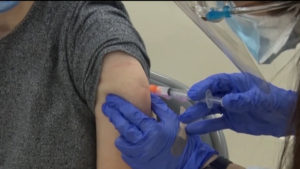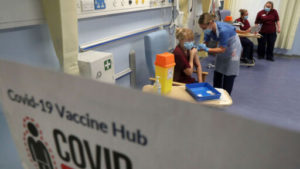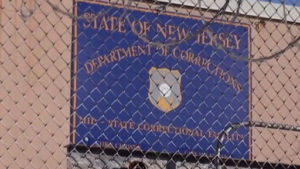With thousands of New Jersey health care and corrections workers still not fully vaccinated against COVID-19, or not vaccinated at all, Gov. Phil Murphy gave them at least six more weeks to comply with his mandate or face consequences.
Wednesday’s executive order updates one Murphy signed in January requiring health care staff and people working in high-risk congregate-living settings, including prisons, to be vaccinated and boosted. The order eliminated a prior option for workers to be tested once or twice a week for COVID-19 instead of having to be vaccinated. The state reportedly spent $9.5 million between mid-October and early February on testing-related costs for state workers. Corrections officers were to have been vaccinated as of Feb. 16, while the deadline for health care workers was Monday.
But only 43% of state Department of Corrections staff had been fully vaccinated by the deadline, with the department needing to replace potentially 4,000 workers to continue to operate its prisons. And officials at hospitals and other health care facilities were concerned the mandate could exacerbate an ongoing staff shortage among nurses and other health care workers.
The executive order gives health care workers until April 11, or within three weeks of becoming eligible, to get a booster. It gives corrections officers and others working in congregate-care settings until May 11 to submit proof of vaccination, including a booster.
Cathy Bennett, president and CEO of the New Jersey Hospital Association, said its members appreciated the “flexibility” in Murphy’s new order that gives workers “additional opportunities to comply” with the booster requirement.
“Our healthcare facilities continue to work closely with their team members to answer concerns, dispel misinformation and increase booster shot acceptance,” Bennett said, adding the new order “will help us meet our shared goal of vaccinating our healthcare workforce.”
Vaccine skeptics
Many of those who have not yet gotten vaccinated or boosted have expressed mistrust in the vaccines because of the speed with which they were developed or complained that they should not be forced into getting the shots. According to the data, about 79% of New Jerseyans age five and older have been vaccinated and 45% of those have also received a booster.
“This executive order ensures that our COVID-19 vaccination requirements for covered workers in medical and high-risk congregate settings are able to properly keep themselves and those whom they care for safe,” Murphy said.
Under the new order, a health care facility, the corrections department or other congregate-living location will be required to take the first step toward bringing an unvaccinated worker into compliance with the order within two weeks of the deadlines — April 11 for health care settings and May 11 for prisons and other locations — or face penalties. The corrections department has stated that staff who do not get vaccinated, or receive a health or religious exemption, face termination. Health care facilities and other employers, including county jails, appear to have more leeway in disciplining staff who do not comply.
“Counties have long been struggling with high job vacancy rates at county correctional facilities and will be hard pressed to terminate county correctional police officers without jeopardizing public safety,” said John Donnadio, executive director of the New Jersey Association of Counties. The organization sent Murphy a letter on Feb. 2 asking to meet with him to discuss the vaccine mandate. At that time, only 58% of county correctional police officers statewide had been vaccinated. County officials were also troubled that their corrections officers were being required to be immunized against COVID-19 but the jail prisoners and police officers transporting them were not.
“I believe a handful of counties may ultimate terminate employees if they do not comply, but the vast majority will not,” Donnadio said. “Although the order requires employers to discipline noncompliant employees, the order also provides employers with the broad discretion to determine what that discipline may be.”
Corrections department still evaluating data
Correction department spokeswoman Liz Velez said the department has not yet taken any disciplinary action against state corrections officers because the department is continuing “to collect and review the data following the first deadline” for vaccination. Since then, the percentage of staff vaccinated has risen to 51%, which is the still lowest of any state department or agency. No disciplinary action means the prisons have “not yet experienced an impact in our operations as a result of the executive order,” she added.

CORONAVIRUS IN NJ
NJ spent at least $9M testing its unvaccinated workforce as a quarter remain without shots
Several Republican legislators said the delay in enforcement will help ensure adequate staffing, but only for another few weeks, and called for an end to the vaccine mandate.
“Rolling the deadline back a few weeks will at least give nursing home operators, elderly residents and their loved ones the chance to let out a collective sigh of relief,” said Sen. Anthony M. Bucco (R-Morris). “But now the deadline is April 11. In true Trenton fashion, Murphy is kicking the can down the road. Better yet, he should kick it off the field completely. There is no need for vaccine mandates.”



